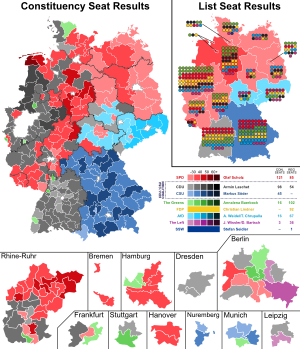
Back Duitse federale verkiesing van 2021 AF Bundestagswahl 2021 ALS الانتخابات الفيدرالية الألمانية 2021 Arabic Парламенцкія выбары ў Германіі (2021) BE Выбары ў Бундэстаг 2021 году BE-X-OLD Федерални избори в Германия (2021) Bulgarian Izbori u Njemačkoj 2021. BS 2021 оной Германиин холбооной һунгуули BXR Eleccions federals alemanyes de 2021 Catalan Německé volby do spolkového sněmu 2021 Czech
| |||||||||||||||||||||||||||||||||||||||||||||||||||||||||||||||||||||||||||||||||||||
All 735 seats in the Bundestag, including 137 overhang and leveling seats 368 seats needed for a majority | |||||||||||||||||||||||||||||||||||||||||||||||||||||||||||||||||||||||||||||||||||||
|---|---|---|---|---|---|---|---|---|---|---|---|---|---|---|---|---|---|---|---|---|---|---|---|---|---|---|---|---|---|---|---|---|---|---|---|---|---|---|---|---|---|---|---|---|---|---|---|---|---|---|---|---|---|---|---|---|---|---|---|---|---|---|---|---|---|---|---|---|---|---|---|---|---|---|---|---|---|---|---|---|---|---|---|---|---|
| Opinion polls | |||||||||||||||||||||||||||||||||||||||||||||||||||||||||||||||||||||||||||||||||||||
| Registered | 61,172,771 | ||||||||||||||||||||||||||||||||||||||||||||||||||||||||||||||||||||||||||||||||||||
| Turnout | 76.4% ( | ||||||||||||||||||||||||||||||||||||||||||||||||||||||||||||||||||||||||||||||||||||
| |||||||||||||||||||||||||||||||||||||||||||||||||||||||||||||||||||||||||||||||||||||
 The left side shows constituency winners of the election by their party colours. The right side shows party list winners of the election for the additional members by their party colours. | |||||||||||||||||||||||||||||||||||||||||||||||||||||||||||||||||||||||||||||||||||||
| |||||||||||||||||||||||||||||||||||||||||||||||||||||||||||||||||||||||||||||||||||||
| This article is part of a series on the |
| Politics of Germany |
|---|
 |
2021 German federal election | |
|---|---|
| Concurrent state elections | |
Federal elections were held in Germany on 26 September 2021 to elect the members of the 20th Bundestag. State elections in Berlin and Mecklenburg-Vorpommern were also held. Incumbent chancellor Angela Merkel, first elected in 2005, chose not to run again, marking the first time that an incumbent Chancellor of the Federal Republic of Germany did not seek re-election.
With 25.7% of total votes, the Social Democratic Party of Germany (SPD) recorded their best result since 2005, and emerged as the largest party for the first time since 2002. The ruling CDU/CSU, which had led a grand coalition with the SPD since 2013, recorded their worst ever result with 24.1%, a significant decline from 32.9% in 2017. Alliance 90/The Greens achieved their best result in history at 14.7%, while the Free Democratic Party (FDP) made small gains and finished on 11.4%. The Alternative for Germany (AfD) fell from third to fifth place with 10.4%, a decline of 2.3 percentage points. The Left suffered their worst showing since their official formation in 2007, failing to cross the 5% electoral threshold by just over one-tenth of a percentage point. The party was nonetheless entitled to full proportional representation, as it won three direct mandates.
With a fifth grand coalition being dismissed by both the CDU/CSU and the SPD, the FDP and the Greens were considered kingmakers. On 23 November, following complex coalition talks, the SPD, FDP and Greens formalized an agreement to form a traffic light coalition, which was approved by all three parties. Olaf Scholz and his cabinet were elected by the Bundestag on 8 December.
Irregularities in Berlin led to repeat elections in February 2023 (state) and February 2024 (federal). The result of the federal repeat election meant that the FDP lost a seat in the Bundestag, while 3 other seats were moved from Berlin to different states.
Cite error: There are <ref group=lower-alpha> tags or {{efn}} templates on this page, but the references will not show without a {{reflist|group=lower-alpha}} template or {{notelist}} template (see the help page).
- ^ Anderson, Emma (5 August 2021). "German Greens must sit out vote in one state during national election". Politico. Archived from the original on 22 October 2021. Retrieved 27 September 2021.





